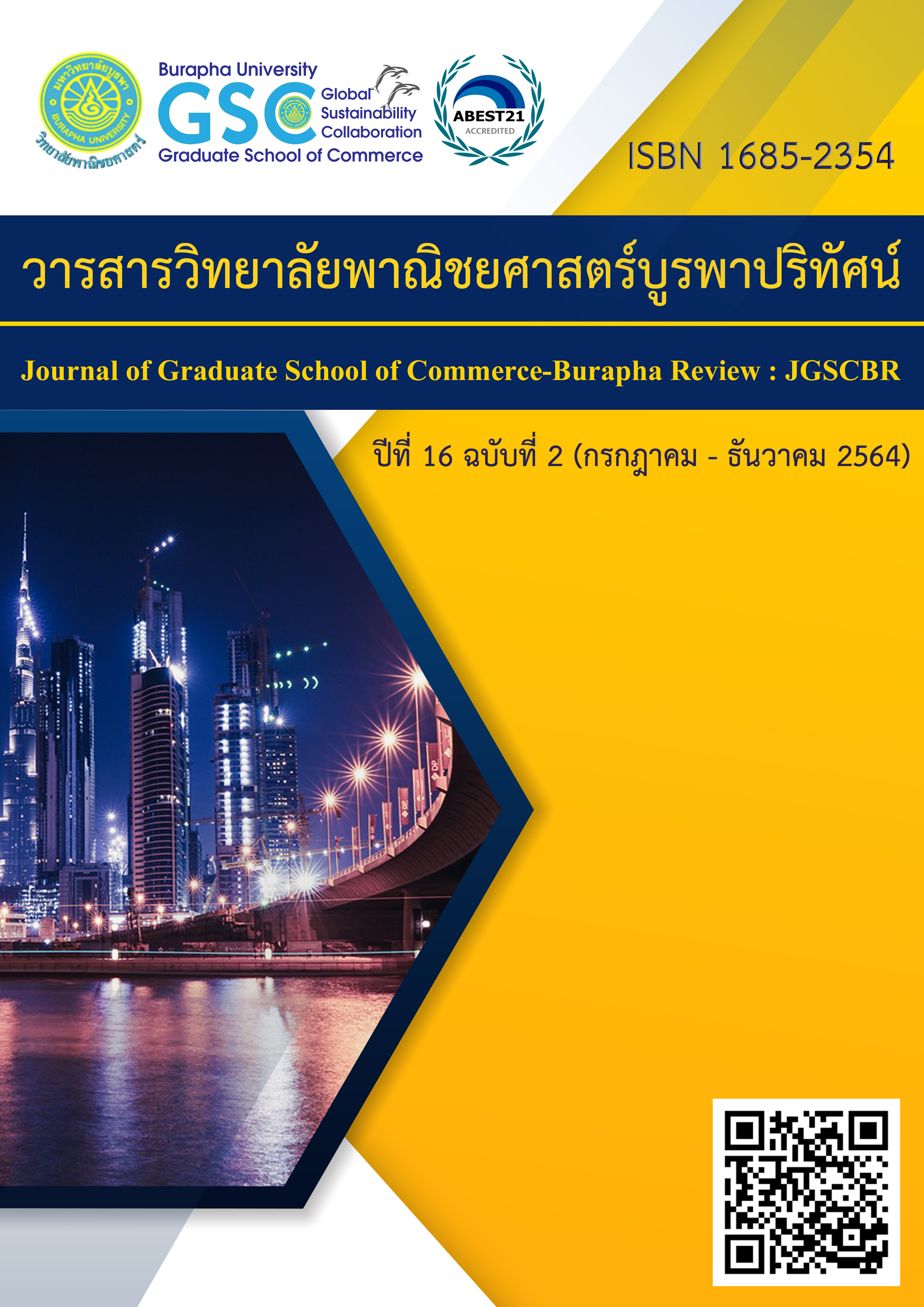CAUSAL FACTOR AFFECTED ON JOB PERFORMANCE OF STRUCTURAL STEEL INDUSTRY STAFF IN SAMUT PRAKAN PROVINCE
Main Article Content
Abstract
This study aimed to explore: (1) level of self-efficacy, work environment, knowledge sharing, and job performance; and (2) causal factors of self-efficacy, work environment, knowledge sharing influencing job performance of structural steel industry staff in Sumut Prakan province. Samples in the study were 130 staff of structural steel industry in Samut Prakan province. A Questionnaire was used as a research instrument in this study. Statistics used in this study included percentage, means, standard deviation, and structural equation modelling analyses. From the results of this study, it was found that: (1) structural steel industry staff in Samut Prakan province had levelled self-efficacy, work environment, knowledge sharing, and job performance at a moderate level for all aspects, ranging from 3.45, 3.46, and 3.47 consecutively, whereas the standard deviation was ranged from 0.871, 0.848, 0.809, and 0.846 consecutively. Additionally, (2) self-efficacy and work environment both had directly influenced on knowledge sharing and job performance of these staff and had indirectly influenced on the job performance as well. Furthermore, knowledge sharing had a direct effect on job performance of these staff.
Article Details
The owner of the article does not copy or violate any of its copyright. If any copyright infringement occurs or prosecution, in any case, the Editorial Board is not involved in all the rights to the owner of the article to be performed.
References
ธัญนันท์ บุญอยู่. (2562). อิทธิพลของความไว้วางใจและการแบ่งปันความรู้ในฐานะปัจจัยคั่นกลางแบบอนุกรมที่เชื่อมโยงความสัมพันธ์ระหว่างทุนทางจิตวิทยาสู่ผลการปฏิบัติงานของพนักงานวิสาหกิจขนาดย่อมของอุตสาหกรรมผลิตเซรามิกในเขตกรุงเทพมหานครและปริมณฑล. วารสารสมาคมนักวิจัย, 24(1), 175-186.
นฤตวัน ชัชราภรณ์. (2559). ภาวะความเครียดจากการทำงานของพนักงานบริษัทนำเข้าเหล็กในเขตกรุงเทพมหานคร. วิทยานิพนธ์วิทยาศาสตรมหาบัณฑิต (สุขภาพจิต), จุฬาลงกรณ์มหาวิทยาลัย.
พชริศ กรุงกาญจนา. (2561). การแบ่งปันความรู้ของพนักงานการไฟฟ้าส่วนภูมิภาค: การวิเคราะห์พหุระดับ. วารสารสุทธิปริทัศน์ มหาวิทยาลัยธุรกิจบัณฑิตย์, 32(104), 1-13.
สภาอุตสาหกรรมแห่งประเทศไทย. (2563). โควิดฉุดใช้เหล็ก 8 เดือนวูบหนัก. ค้นเมื่อ 19 ตุลาคม 2563, จาก https://www.fti.or.th.
Abdiwali, R., & Musa, M. (2019). On-the-job training and employee performance in petroleum companies in Uganda. International Journal of Research Granthaalayah, 7(8), 51-61.
Ahmad, F., & Karim, M. (2019). Impacts of knowledge sharing: A review and directions for future research. Journal of Workplace Learning, 31(3), 207-230.
Ahmad, S. A., Easa, N. F., & Mostapha, N. (2020). Knowledge sharing and innovation at the Lebanese banking industry. BAU Journal-Creative Sustainable Development, 1(2), 1-18.
Aksoy, Y., Ayranci, E., & Gozukara, E. (2016). A research on the relationship between knowledge sharing and employee performance: The moderating role of unethical behaviors in organizational level. European Scientific Journal, 12(4), 335-352.
Best, J. W. (1981). Research in education. (4th ed.). Englewood Cliffs, New Jersey: Prentice-Hall.
David, F., Lapian, S. L., & Pandowo, M. (2018). The effect of organizational justice and self–efficacy on knowledge sharing in M-19 shop at Manado. Journal EMBA, 6(4), 3248-3257.
Demir, S. (2020). The role of self-efficacy in job satisfaction, organizational commitment, motivation and job involvement. Eurasian Journal of Educational Research, 85, 205-224.
Farooq, R. (2018). A conceptual model of knowledge sharing. International Journal of Innovation Science, 10(2), 238-260.
Ibus, S. B., & Ismail, F. B. (2018). Conceptual framework: The mediating effect of self-efficacy in the relationships of self-leadership, knowledge sharing, and innovative work behavior. International Journal of Academic Research in Business and Social Sciences, 8(11), 1859–1876.
Jamil, N. L., & Mahmud, S. N. D. (2019). Self-efficacy relationship on science achievement amongst national secondary school students. Creative Education, 10, 2509-2527.
Javaid, M., & Abdullah, N. H. (2020). The effects of self-efficacy and expectations on knowledge sharing behavior. International Journal of Scientific & Technology Research, 9(3), 2050-2055.
Jayaweera, T. (2015). Impact of work environmental factors on job performance, mediating role of work motivation: A study of hotel sector in England. International Journal of Business and Management, 10(3), 271-278.
Khalique, S., & Singh, M. K. (2019). Role of self-efficacy in improving employees performance. International Journal of Engineering Research & Technology, 7(12), 1-5.
Krejcie, R. V., & Morgan, D. W. (1970). Determining sample size for research activities. Educational and Psychological Measurement, 30, 607-610.
Lai, M. C., & Chen, C. C. (2012). Self-efficacy, effort, job performance, job satisfaction, and turnover intention: The effect of personal characteristics on organization performance. International Journal of Innovation, Management and Technology, 3(4), 387 -391.
Likert, R. A. (1932). A technique for the measurement of attitudes. Archives of Psychology, 140, 5-53.
Maidin, F. N., & Izhar, T. A. T. (2018). A Framework Based knowledge sharing factor in higher institution. International Journal of Academic Research in Business and Social Sciences, 8(6), 846–861.
Msengeti, D. M., & Obwogi, J. (2015). Effects of pay and work environment on employee retention: A study of hotel industry in Mombasa county. International Journal of Scientific of Scientific and Research Publications, 5(4), 1-10.
Ndulue, T. I., & Ekechukwu, H. C. (2016). Impact of job satisfaction on employee performance: A study of Nigerian Breweries Plc Kaduna State Branch, Nigeria. Arabian Journal of Business and Management Review, 5(11), 13-23.
Octavianus, S. S., & Riyanto S. (2020). The effect of compensation and work environment on employee performance. International Journal of Engineering Research & Technology, 9(6), 59-61.
Shaari, R., Rahman, S. A. A., & Rajab, A. (2014). Self-efficacy as a determined factor for knowledge sharing awareness. International Journal of Trade, Economics and Finance, 5(1), 39-42.
Sharma, P. (2020). Work environment: A key variable to faculty retention. International Journal of Scientific and Research Publications, 10(6), 344-347.
Waktola, B. S. (2019). Boosting employee performance impact of working environment on employees performance: Case study on Ethio-Telecom at Ambo Branch. Global Journal of Management and Business Research, 19(11), 42-50.
Weijs-Perrée, M., Appel-Meulenbroek, R., Arentze, T., & Romme, G. (2019). The influence of the physical work environment of business centers on social networking and knowledge sharing in the Netherlands. Intelligent Buildings International, 11(2), 105–125.
Widyani, A. A. D., Sarmawa, I. W. G., & Dewi, I. G. A. M. (2017). The roles of knowledge sharing in mediating the effect of self-efficacy and self-leadership towards innovative behavior. Journal Manajemen Dan Kewirausahaan, 19(2), 112-117.


